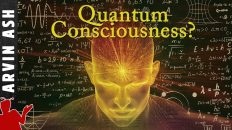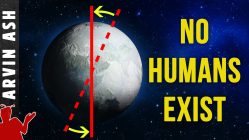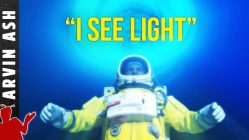What if you are the only conscious mind? What if the universe revolves around you? Solipsism’s scary implications. Who is the person looking through your eyes? When you look in the mirror, who do you really see? Have you really thought about this question?
Isn’t YOUR consciousness the only thing that matters in the universe? From your point of view, the only sentience you have is your own. You can’t know or perceive whether anyone else is really conscious.
What if they aren’t? What if you’re the only one? Could the world essentially be revolving around you? Could it literally be your oyster? This is the essence of Solipsism. Some say that this is the scariest philosophy of consciousness known to man.
Could it be true? What does science have to say about this? The scary, crazy, and absurd science of Solipsism is coming up right now…
I remember as a kid looking in the mirror, and sometimes perceiving that the image in the mirror was not really me. Who was looking back? And it was a bit scary, and I would hide from my own reflection.
What do you really see when you look in the mirror. A scientist might say that when you look through your eyes, packets of electromagnetic radiation, called photons enter the pupil of your eye, get focused by a lens, hit your retina and trigger electrical signals in your optic nerve, that travels to the LGN, then to visual cortex in the back of your brain, where it gets interpreted and is made available to your consciousness which may be located according to recent studies in a tiny area of the brainstem called pontine tegmentum and 2 small areas of the cerebral cortex connected to it.
A philosopher might say that the you are the consciousness behind your eyes. The you is your awareness of yourself and your surroundings, and your place in the universe. You are a sentient being with thoughts, feelings, perceptions, needs, and desires along with other sentient beings on a planet floating in vast universe, in a time you call the now.
A Solipsist shares a slightly different viewpoint. He or she believes that she is the consciousness behind her eyes, alright, but the difference is she believes she is the ONLY consciousness. she believes not only that consciousness is fundamental to the universe, but that only her consciousness is fundamental in the universe in which she resides.
you can only be certain that you are here. Everyone else may be a mirage at worst, or irrelevant at best.
There was a great movie called The Truman Show starring Jim Carey, where an entire reality TV series was created around Truman, played by Carey. Carey was born in this world and it is all he had ever known. But the world was really an elaborate movie set and everyone around him was an actor. Truman was the only person who didn’t know that he was on a television show.
Could the universe be kind of your very own show, where everything in really just revolving around you. You know you exist because your consciousness says so. You cannot be sure anyone else really exists.
Is there any irrefutable proof of anything other than the existence of yourself? If that is the case then is it rational to assume that anything else actually exists?
What does science have to say about this.
There is something called information theory that says that a closed system, and presumably your universe that revolves around you is a closed system, cannot generate something more complex than itself.
The question is, is your universe more complex than yourself. The answer would probably be yes. The universe behaves in mostly predictable ways following a set of laws, that you proabably did not come up with. Are you Einstein, Max Plank, Nicola Tesla? Since you are not the scientist that came up with the laws of this illusion of the universe, how would you explain the fact that other people, whom you don’t think exist came up with the laws that explain your world? What about some of the greatest creations like from Mozart, Shakespeare and Michelangelo?
Explain this may be more difficult than concluding that perhaps you are not the only conscious being. But maybe everything is perceived by you as being more complicated and more creative than you are, but maybe it isn’t. Maybe complicatedness and creativity could be part of the illusion too.
Science doesn’t claim to know the ultimate reality, at least not yet, without a theory of everything. But even we had such a theory, if everything is an illusion, then science can only tell us what is true within that illusion.
Science treats reality as a foundation; the universe exists apart from our own mind and senses. It says that we going to see the same things whether we’re in a subjective or objective reality.
So now the question is, “is reality objective or is it subjective?” – Most scientist will say that it is objective, that objectivity is a given. It’s the canvas on which the laws of physics make predictions. But science only assumes that objective reality exists.
But a paper published in 2019, by Massimiliano Proietti at Heriot-Watt University in Edinburgh, experimentally replicated a famous thought experiment proposed by Eugene Wigner. This research seems to indicate that at the quantum level, two different realities could both be correct, suggesting that an objective reality may not actually exist. At least not at the quantum level.
If reality is subjective, could it all be a simulation, like in the movie the Matrix? But if we are living in a simulation, then everything is an illusion including what you know as you. The simulation is apparently so complex that it can simulate consciousness in at least one of its characters – you.
But why would the simulation only simulate one conscious character out of billions – maybe to save memory space? But this would not make sense because then you would have to create a separate world for every conscious creature that you are simulating. If simulating humans, this would mean 7.5 billion different worlds. One for every human being. This would increase the memory requirement. Wouldn’t it be more logical to simulate all humans in one matrix instead of billions of separate matrices?
Maybe advanced beings want to test the theory of Solipsism in a simulation? Maybe you are something special and they want to build a world around you? But then why would advanced beings be so interested one particular avatar? What would be the purpose of that?
But one of the questions that even solipsists have to ask themselves is, “Are you even conscious?” Scientists cannot solve the problem because there is no such thing as “consciousness detector.” There is no objective measurement of consciousness. If there was, we could settle this question once and for all.
This could be easily solvable in the future, if we can figure out a way to connect with other brains. Some futurists, such as Ray Kurzweil, estimate that we will achieve this within 30 years. Once you can go inside my brain, you will know of sure whether I am conscious or not.
But what is consciousness anyway?
Does it require A nervous system? The ability to learn and adapt to new circumstances? Free will.
Are all animals conscious? What about jellyfish or trees, that don’t have a central nervous system.
Can AIs be conscious. They are just a mass of metal, silicon and other non biological materials. They learn. They can change their behavior independently of any humans. They will develop a kind of free will in the future. Their behavior cannot necessarily be predicted. But their brains are dealing in binary language, consisting of ones and zeros. Does this mean they are not really conscious?
If they are not conscious, then what makes you think you’re conscious. In many cases they are smarter than us, they can beat us at chess, design better cars, and they can even program. If we ask an AI of the future, he might say he is indeed conscious. How will we know for sure? If we declare that they are not really conscious, then how can we be sure any human is conscious?
They are made of material just like us, different material, but material nevertheless, and their behaviors are also determined by the firing of electromagnetic signals inside a central processor. So are humans. Our processor is called the brain.
We all live in our own subjective realities. Is the human mind really capable of being truly objective? Our realities all interact and we are able to independently observe the same things. Shouldn’t that mean that we are all part of the same reality?
A Solipsist will say, not necessarily, because you could be a figment of my imagination, or we could both be figments of somebody else’s imagination, or maybe nobody exists and everything is imaginary.
You think, therefore you are. You do not know if anyone else really thinks, and therefore you cannot know whether they are.
Solipsism is not disprovable. But lots of things are not disprovable. This does not make it true.
You could argue that solipsism is completely useless because it cannot be disproven, and it doesn’t give you much in the way of making your life better. But its uselessness does not make it false.
Note that Solipsism is not synonymous with Narcissism.







